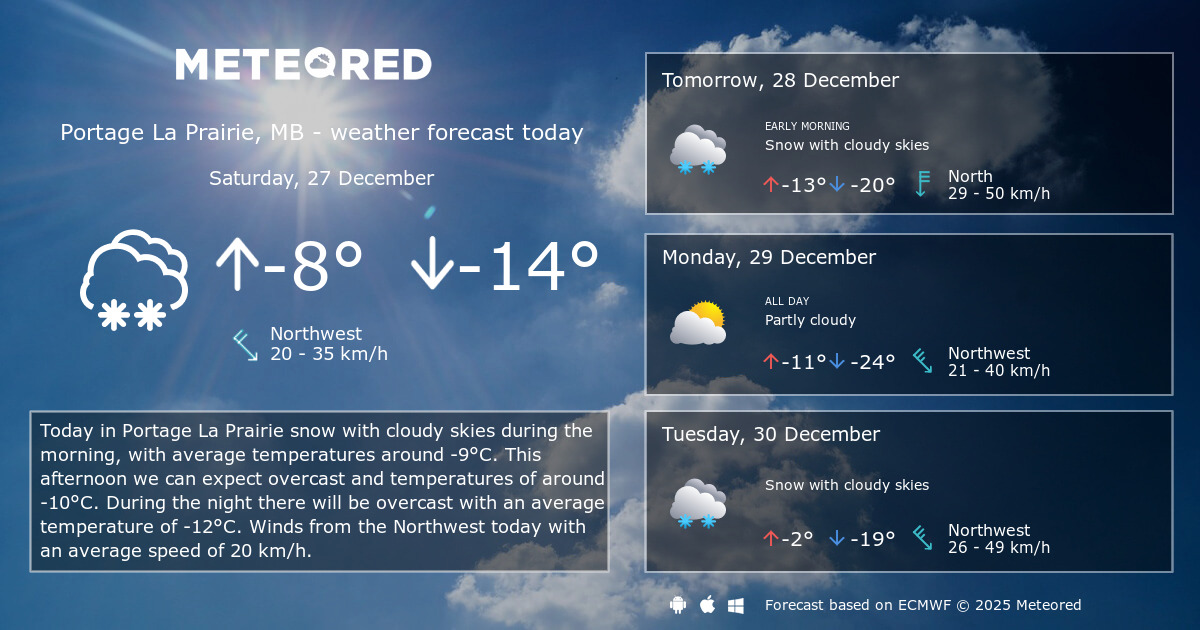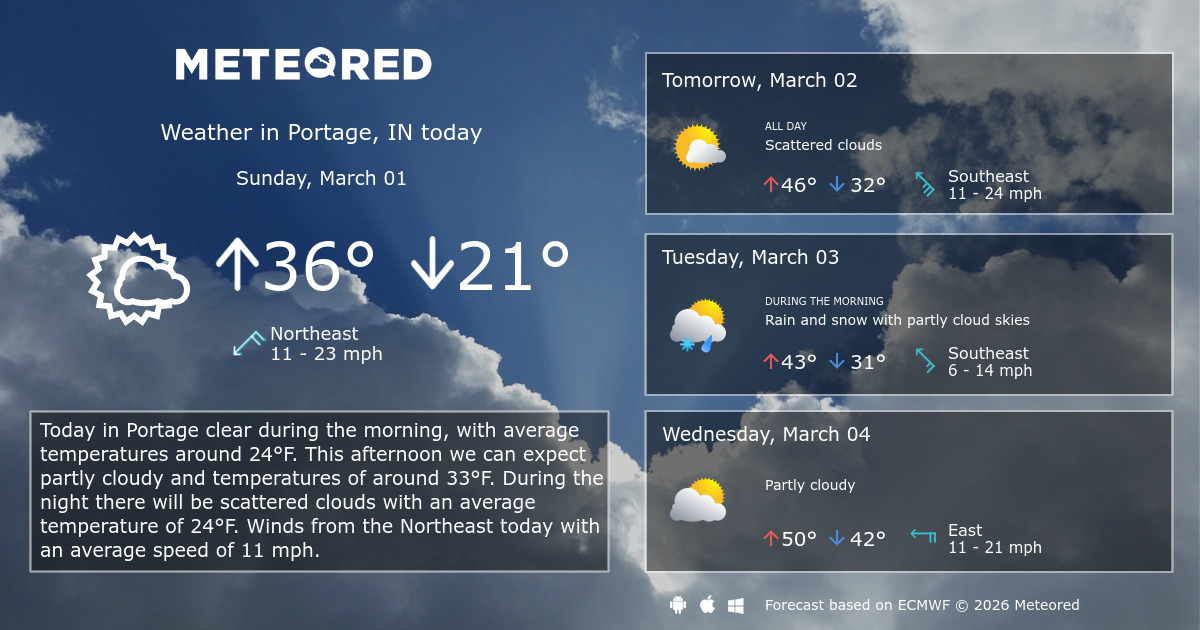Weather Conditions and Patterns: Portage Weather

Portage weather – Portage experiences a humid continental climate, characterized by warm, humid summers and cold, snowy winters. The city’s proximity to Lake Michigan significantly influences its weather patterns, resulting in a lake-effect snow phenomenon that brings heavy snowfall during the winter months.
The portage weather is unpredictable. As we braced ourselves for the storm, I couldn’t help but think of the comforting sweetness of a McDonald’s Grimace Shake. Its vibrant purple hue and creamy texture would surely lift my spirits. But as the winds howled and the rain lashed against our tent, I knew that for now, I could only dream of that indulgent treat.
Yet, amidst the tempest, the thought of the Grimace Shake lingered in my mind, a reminder that even in the face of adversity, there were moments of pure delight to look forward to once the storm had passed.
Temperature
Portage’s average annual temperature is 46.7°F (8.2°C). Summer temperatures typically range from the mid-60s to the mid-80s (°F), with occasional heat waves pushing temperatures into the 90s. Winters are cold, with average temperatures hovering around 20°F (-6.7°C). Extreme cold snaps can drop temperatures below 0°F (-17.8°C).
Portage weather can be unpredictable, but one thing is for sure: it’s always changing. Just when you think you’ve got it figured out, a tornado warning can pop up out of nowhere. And when that happens, it’s time to take cover.
But even after the storm has passed, the weather can still be a bit crazy. So be sure to check the forecast before you head out.
Precipitation
Portage receives an average of 35 inches (889 mm) of precipitation annually, distributed fairly evenly throughout the year. Snowfall is a significant component of the city’s precipitation, with an average of 70 inches (1778 mm) falling each winter. The lake-effect snow phenomenon often leads to localized areas of heavy snowfall, creating snowdrifts and hazardous driving conditions.
The portage weather is a fickle mistress, one moment she’s smiling down on you with sunshine and the next she’s throwing a tantrum with rain and wind. But one thing is for sure, she’s always unpredictable. If you’re planning on doing any portaging, it’s important to be prepared for all types of weather.
Check the portage weather forecast before you head out, and make sure you have the appropriate clothing and gear. And most importantly, be flexible. If the weather turns bad, don’t be afraid to change your plans.
Wind Patterns
Portage experiences prevailing westerly winds throughout the year. These winds often bring moisture from Lake Michigan, contributing to the city’s humid climate. During the summer, lake breezes can provide relief from the heat, while winter winds can exacerbate the cold and wind chill factor.
Portage weather can be unpredictable, with sudden shifts in conditions. For example, a recent tornado warning in Wellington caught residents off guard, reminding us of the importance of staying alert to weather updates. Fortunately, the storm passed without incident, but it’s a reminder that Portage weather can change quickly, and it’s essential to be prepared for anything.
Seasonal Variations, Portage weather
Portage’s weather patterns exhibit distinct seasonal variations. Summers are warm and humid, with occasional thunderstorms. Fall brings cooler temperatures and vibrant foliage. Winters are cold and snowy, with frequent snowstorms and icy conditions. Spring is a transitional season, marked by milder temperatures and increased precipitation.
Portage weather has been quite unpredictable lately. It can be sunny one minute and raining the next. To stay up-to-date on the latest weather forecast, be sure to check out the kalamazoo news. The website provides detailed weather reports for the Portage area, so you can plan your day accordingly.
Even though the weather has been unpredictable, it’s still important to enjoy the outdoors. So bundle up and head to one of Portage’s many parks or trails.
Extreme Weather Events
Portage is prone to several extreme weather events, including:
- Lake-effect snow: The proximity to Lake Michigan creates a lake-effect snow phenomenon, resulting in heavy snowfall during winter months.
- Blizzards: Blizzards, characterized by heavy snowfall, strong winds, and poor visibility, can occur during the winter months.
- Thunderstorms: Portage experiences occasional thunderstorms during the summer months, sometimes accompanied by hail or strong winds.
- Heat waves: Heat waves, with temperatures reaching into the 90s (°F), can occur during the summer months.
- Extreme cold: Extreme cold snaps, with temperatures dropping below 0°F (-17.8°C), can occur during the winter months.
Historical Weather Data and Trends

Portage’s historical weather data reveals several long-term trends and patterns. The region has experienced a gradual increase in average temperatures over the past century, consistent with global warming trends. Additionally, there has been a slight decrease in precipitation, particularly during the summer months.
Climate Change Impacts
Climate change is significantly affecting weather patterns in Portage. Rising global temperatures are leading to more frequent and intense heat waves, while changes in precipitation patterns are contributing to an increased risk of droughts and floods.
Comparison to Nearby Regions
Compared to nearby regions, Portage experiences a relatively mild climate. The area has fewer extreme temperature fluctuations and less precipitation than inland areas, due to its proximity to Lake Michigan. However, Portage’s weather is still influenced by large-scale weather systems that affect the Midwest region.
Weather Forecasting and Preparedness

Staying informed about weather conditions is crucial for safety and well-being in Portage. Accurate weather forecasts help individuals plan their activities, make informed decisions, and prepare for potential weather-related emergencies.
Accessing Weather Forecasts
- Local Weather Stations: Portage has several weather stations that provide real-time weather updates and forecasts. These stations can be accessed online or through mobile applications.
- National Weather Service (NWS): The NWS provides detailed weather forecasts and warnings for Portage and the surrounding areas. Their website and mobile app offer up-to-date information on current conditions, severe weather alerts, and long-term forecasts.
- Commercial Weather Services: Various commercial weather services offer subscription-based access to advanced forecasting tools and detailed weather data.
Interpreting Weather Forecasts
Understanding weather forecasts is essential for effective preparation. Forecasts typically include information on temperature, precipitation, wind speed and direction, and humidity. By interpreting these elements, individuals can assess the potential impact of weather conditions on their plans and safety.
Emergency Preparedness
Severe weather events can pose significant risks to life and property. Being prepared for these emergencies is crucial for minimizing their impact.
Tornadoes
- Stay Informed: Monitor weather forecasts and listen to local news for tornado warnings.
- Seek Shelter: If a tornado warning is issued, seek shelter immediately in a sturdy building, basement, or underground structure.
- Protect Yourself: Stay away from windows and doors. Cover yourself with blankets or pillows to protect from debris.
Floods
- Avoid Flooded Areas: Never drive through flooded roads or cross flooded streams.
- Evacuate: If flooding threatens your home or property, evacuate to higher ground.
- Protect Valuables: Move important belongings and valuables to higher levels of your home.
Winter Storms
- Stay Informed: Monitor weather forecasts for winter storm warnings and advisories.
- Stock Up: Keep an emergency supply kit with food, water, blankets, and other essentials.
- Prepare Your Home: Insulate your home, clear snow from driveways and walkways, and have a snow shovel and ice melt on hand.